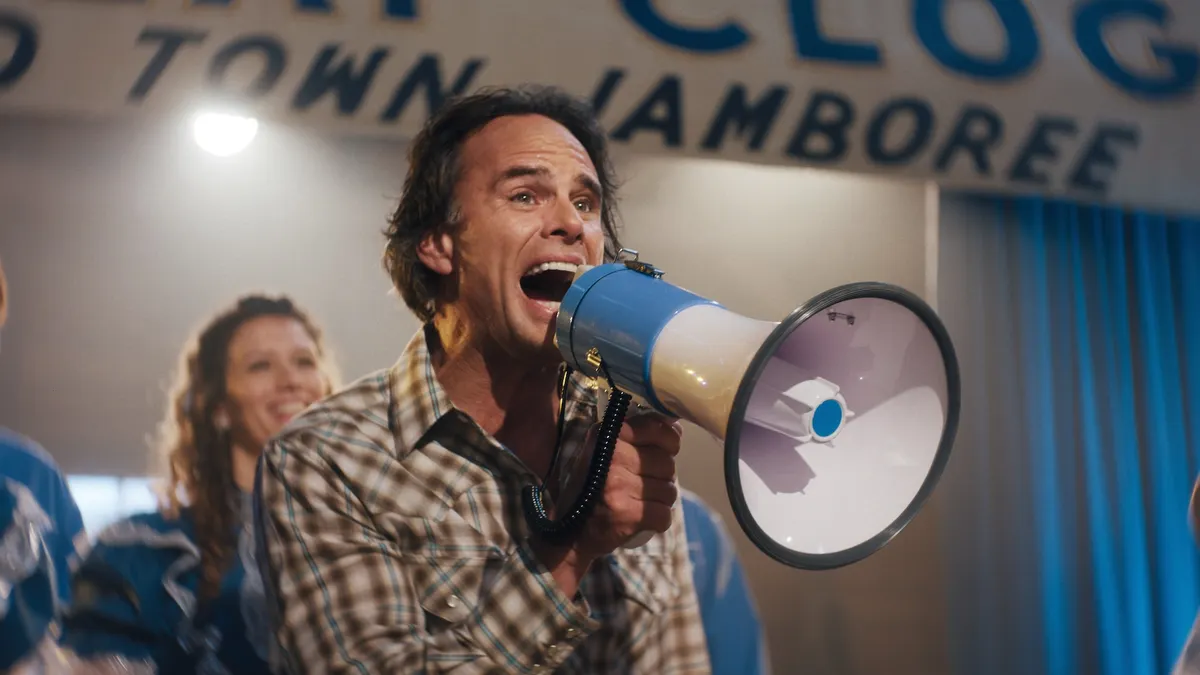Tradition will tell you that a woman's place is in the home and a retailer's place is out of politics. But as with everything else in the modern world, that's changing. Women are taking on leadership roles in way more than just the household and, more and more, retailers are sharing opinions on political and social issues.
What would have been taboo 20 years ago is now becoming just another way for retailers and brands to form more meaningful connections with customers — and since our closely-held social and political beliefs have powerful meaning, that could be a pretty powerful attachment for a brand to make.
"It was not part of a strategic business plan to say 'let's go to the center of culture and create an ad that hits the zeitgeist of the moment to connect the world that we know with music."

James Curleigh
President of Global Brands at Levi's
"Customers will be even a little bit more forgiving or accepting, or go a little bit more out of their way if they have that emotional connection," Lauren Bitar, director of retail consulting at RetailNext, told Retail Dive. "Otherwise it's like, 'where can I get this as cheaply and quickly as possible.'"
Here are some of the brands doing it best — from what they stand for to how they manage to insert themselves into the public conversation.
Levi's on joining the cultural conversation
How does a denim manufacturer become part of a global conversation? In what way could a retailer like Levi's possibly turn jeans into a statement about social issues, diversity and inclusivity? Pretty easily, if you take a look at Levi's "Circles" commercial, which has over 22 million views on YouTube alone.
The commercial has a unifying tone, tying together people with different backgrounds and ethnicities under two banners: jeans and music. At a time of isolationism and division, especially in the United States, that can be a powerful message — and according to James Curleigh, president of global brands at Levi's, the idea came from observations about human nature, not politics.
"It was not part of a strategic business plan to say 'let's go to the center of culture and create an ad that hits the zeitgeist of the moment to connect the world that we know with music,'" Curleigh said at a panel during the National Retail Federation's Big Show. "But we found the insights around the world. Every party you go to that involves relatives, friends, family and a moment of celebration: How does it end? With music, with a circle, with someone awkwardly getting in the middle, expressing themselves in a way they never planned to when they got there that night. But they wake up the next morning and go 'oh my god that was awesome.'"
Levi's struck a chord — and that's increasingly important for retailers and brands looking to create emotional connections and foster a sense of belonging, which is key for a strong relationship, according to Shannon Warner, a retail managing consulting partner at Capgemini.
"That's creating a sense of 'do I fit with this brand,'" Warner told Retail Dive. "So that's how you engage through social, it's how your peer group is talking about a particular brand or product.'"
In general, Warner points to positive emotions as being the most effective when it comes to the consumer-brand relationship. While taking a stance on an issue can be powerful, it can also be isolating if a retailer chooses a polarizing issue. Something like inclusivity, however, is hard to be offended by — and will likely only increase a customer's perception of a given company, provided they deliver on easy promises like shipping dates and keeping inventory stocked.
"Delivering the expected has never been more important than it is today."

James Curleigh
President of Global Brands at Levi's
While it can be tough for retailers to calculate the ROI of emotionally connecting with their customers, a study by the Fashion Institute of Technology found that millennials were drawn to retailers that fulfill a "trust loop" with the customer and nearly half (47%) want brands to take responsibility for their mistakes. Capgemini's own study on brand loyalty from December reveals similar findings, including the fact that millennials post the most emotional engagement (58%) with brands.
For Levi's, maintaining consumer trust is a key part of the consumer-brand relationship. "We also have a basic fundamental promise to our fan, to the consumer, that we can meet and hopefully exceed their expectations," Curleigh said, adding that, "delivering the expected has never been more important than it is today."
How Patagonia and Cards Against Humanity get political
As with just about every rule, there are exceptions. In this case, retailers can rally around political causes and manage to make it profitable — and gain loyal followings in the process — because the social cause of choice aligns so closely with the brand's identity.
An extreme example would be the stunt that Cards Against Humanity pulled this November, when the company bought a vacant plot of land on the Mexican border, asked customers to pay $15 for an "America-saving" box and in return vowed to make it as difficult as possible for President Donald Trump to build the wall.
"You get into trouble when you try to be everything to everybody."

Ray Hartjen
Director of Content Marketing and Public Relations at RetailNext
Far from trying to include everyone, the retailer's website for a time jokingly announced that, "if you voted for Trump, you might want to sit this one out." And it worked. The promotion sold out within hours, according to CNN. And it's hardly surprising that a company with a product that, by definition, is meant to be polarizing and offensive, wouldn't worry about isolating a single group.
"You get into trouble when you try to be everything to everybody," Ray Hartjen, director of content marketing and public relations at RetailNext, told Retail Dive. Cause marketing can be a good path for retailers as long as they choose something that is consistent with the brand message. "I think it really works. It's a way of cutting through the noise and understanding your brand in a genuine way," Hartjen said.
Patagonia occupies a similar, politically-charged space — the outdoors retailer released its first ever TV ad in August, which featured founder Yvon Chouinard calling viewers to take on the Trump administration and stand up for public lands. That campaign was followed by an equally bold statement in December, when the company's website declared that, "The President Stole Your Land," calling it, "the largest elimination of protected land in American history."
The company's dedication to environmentalist causes is only growing, and the retailer recently launched another call to action: a platform called "Patagonia Action Works," which connects activists — customers or not — with grassroots causes.
"If you've been paying attention, you'll know that things aren't going very well for the planet," Chouinard said in a video explaining the Action Works campaign. "It's pretty easy to get depressed about it. I've always known that the cure for depression is action."
The video is in line with past efforts from the company, which have included donating Black Friday profits to environmental causes and giving employees Election Day off to encourage customers to vote. That move works for Patagonia because environmentalism and the outdoors go hand-in-hand, so they're appealing to a cause that their core customer base most likely already feels passionately about. For others, it's not so simple.
How retailers get it wrong
The road to activist advertising is riddled with speed bumps and potholes, and it's easy for retailers to start down one path and realize halfway through what seemed like a paved street is more like gravel. For the most part, that happens because retailers either missed the mark emotionally or with their chosen cause.
According to Capgemini, only 15% of customers think brands do a good job of bonding with them emotionally, and other studies have found that executives aren't so confident either. Consumers have high expectations when it comes to the consumer-brand relationship: they value trust and honesty more than any other emotion and the majority (86%) of customers with high emotional engagement expect loyalty from the brand in return, Capgemini found.
"It's great if you know, as a shoe brand, you really care about the bald eagle ... but how meaningful is that to your customer and to your value proposition?"

Lauren Bitar
Director of Retail Consulting at RetailNext
The biggest problems arise when retailers see a different brand trying something and they try to copy it, Warner told Retail Dive. "I think that's a mistake. I think the most important thing that brands need to do is know who their customer base is and serve that customer base," Warner said. "Be loyal to them as much as you want your customer to be loyal to you."
And that extends to which social causes a retailer chooses to champion. Younger generations tend to prefer retailers that have a cause — 55% of Gen Z chooses brands that are socially responsible and eco-friendly — but adopting a cause just to tap into that market isn't going to fly. Activist causes that are related to the brand are much more likely to resonate with customers.
"It's great if, as a shoe brand, you really care about the bald eagle," Bitar said. "It's great to take a stance, but how meaningful is that to your customer and to your value proposition?"
It isn't hard to see where retailers have gone wrong. In particular, Pepsi's Kendall Jenner ad comes to mind, where the retailer tried to make a sensitive campaign reacting to protest culture and instead ended up making a lot of fans really angry. The risks increase when a retailer tries to engage with political, or otherwise divisive, issues and retailers should be careful about how they approach hot button issues.
"It is essential for brands to have a personality, to build an identity, to stand for something."

Shannon Warner
Retail Managing Consulting Partner at Capgemini
Warner points out that advocating for the environment, for example, is a safer bet than speaking out against the President. In the former case, a retailer will likely draw in environmentally-conscious shoppers without offending other customers, whereas in the latter instance, retailers risk isolating a segment of the population based simply on how they voted.
Fear of customer retribution doesn't justify a bland marketing platform, but it does call for a certain level of caution from retailers looking to enter the activist advertising space.
"It is essential for brands to have a personality, to build an identity, to stand for something," Warner said, "And I think the brands that are just sort of there are going to be the brands that fall by the wayside."





















